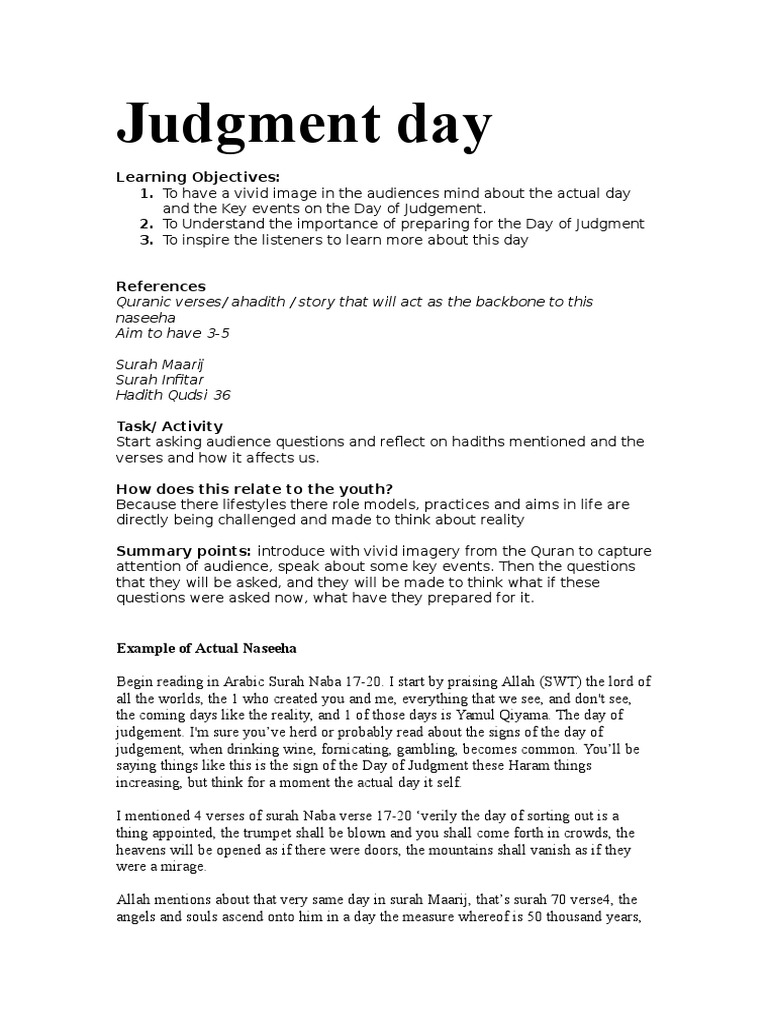In the pursuit of understanding the concepts of the afterlife, the Baha’i Faith offers a distinctive narrative that reframes the traditional notions of judgment and accountability. Central to Baha’i teachings is the idea of progressive revelation, which posits that spiritual truth is revealed by God through various Prophets and Messengers throughout history. This article will delve into the fundamental Baha’i perspectives on the Day of Judgment, exploring how these teachings challenge conventional beliefs and encourage a transformative outlook on existence.
To engage with the question of whether there will be a Day of Judgment, one must first grasp the Baha’i view of God’s nature. In Baha’i theology, God is transcendent, ineffable, and beyond human comprehension. This philosophical positioning fosters a rich tapestry in which temporal existence interweaves with the eternal. Therefore, the notion of judgment is not confined to a singular climactic event at the end of time, but is instead perceived as a continuous, evolving process that manifests both in an individual’s life and within the broader context of humanity’s collective spiritual journey.
The Baha’i interpretation of judgment is deeply connected to the concept of the “Manifestation of God.” Each Prophet or Messenger comes forth at preordained intervals, bringing divine guidance suitable for the societal and spiritual needs of the time. This progression encourages adherents to elevate their understanding and adapt to new revelations. Thus, the “judgment” each individual faces is inherently linked to their response to these teachings and their ability to integrate divine insights into their daily lives. In this light, the Day of Judgment is not a distant event but rather an ongoing opportunity for introspection, growth, and alignment with divine will.
Furthermore, Baha’i scripture emphasizes the idea of spiritual awakening. It posits that every individual is endowed with the capacity to discern truth and develop their own understanding of God’s attributes. This self-awareness is essential to one’s judgment. The soul’s journey does not culminate in a singular moment of reckoning, but rather unfolds continuously as individuals strive to embody the virtues extolled by the Manifestations. Each action, thought, and intention contributes to the soul’s development, enabling a gradual “judgment” that enriches one’s spiritual essence.
The Baha’i perspective also highlights the concept of divine justice, which diverges significantly from traditional interpretations that often evoke fear and anxiety. Rather than a punitive reckoning, the Baha’i vision embodies a compassionate and loving judgement that reflects the grace of God. Every soul is treated with equity and is afforded the potential to redeem itself through acts of goodness and love. This approach radically shifts the focus from fear of punishment to a more profound understanding of accountability as a nurturing force for personal and communal evolution.
In the grand narrative of human existence, the Baha’i teachings suggest that humanity is engaged in a collective spiritual awakening. This awakening is characterized by the unraveling of knowledge and understanding through trials and tribulations. Just as the prophets before have faced adversities, today’s believers are called to navigate a tumultuous world and to embody the principles of unity, justice, and peace. Each individual’s response to global challenges can be seen as a part of their personal and collective judgment process. Embracing this perspective incites curiosity about the potential impact each person can have in contributing to a brighter future.
Moreover, the notion of the Day of Judgment in Baha’i thought is intricately linked to the community’s role in fostering a conducive environment for spiritual growth. The Baha’i community emphasizes the importance of collective worship, consultation, and service. It is through active engagement in these spiritual practices that individuals can find support in their personal judgments and spiritual endeavors. The community itself becomes a crucible for spiritual awakening, wherein members uplift one another towards greater adherence to Baha’i principles. This communal approach cultivates an atmosphere that encourages growth, inquiry, and an intrinsic desire to seek divine understanding.
Another compelling dimension of Baha’i teachings regarding judgment is the concept of inherent human value. Every soul is regarded as a unique reflection of the Divine, possessing the potential for great accomplishments regardless of past actions. The Baha’i Faith embraces the philosophy that even those who may have strayed from the path of righteousness possess intrinsic worth and the capacity for reform. This radical acceptance serves as a catalyst for transformation, illustrating that the journey does not end but rather evolves continuously through sincere repentance and the conscientious effort to align with divine virtues. Thus, the question of judgment morphs into an opportunity for growth and reinvention.
As this exploration unfolds, one may ponder the profound implications of these teachings within the context of contemporary life. The promise of continuous growth resonates deeply in a world often fraught with discord and division. Baha’i teachings encourage individuals to shift their focus from fear of impending judgment to an active pursuit of personal holiness and collective upliftment. This shift fosters a greater understanding of the interconnectivity of all souls and a heartfelt acknowledgment that every action ultimately contributes to the unfolding of divine purpose.
In conclusion, Baha’i perspectives on the Day of Judgment invite individuals to engage deeply with their spiritual potential. Rather than portraying judgment as an isolated endpoint, the Baha’i Faith reinterprets this concept as an ongoing journey of enlightenment, accountability, and transformation. By embracing this holistic view, one is encouraged to foster curiosity about their spiritual conditions, to seek understanding, and to partake actively in the luminous tapestry of divine existence. The principles elucidated through Baha’i teachings usher in a new paradigm, one characterized by hope, empowerment, and unity, ultimately positioning humanity toward a collective awakening in alignment with divine will.
